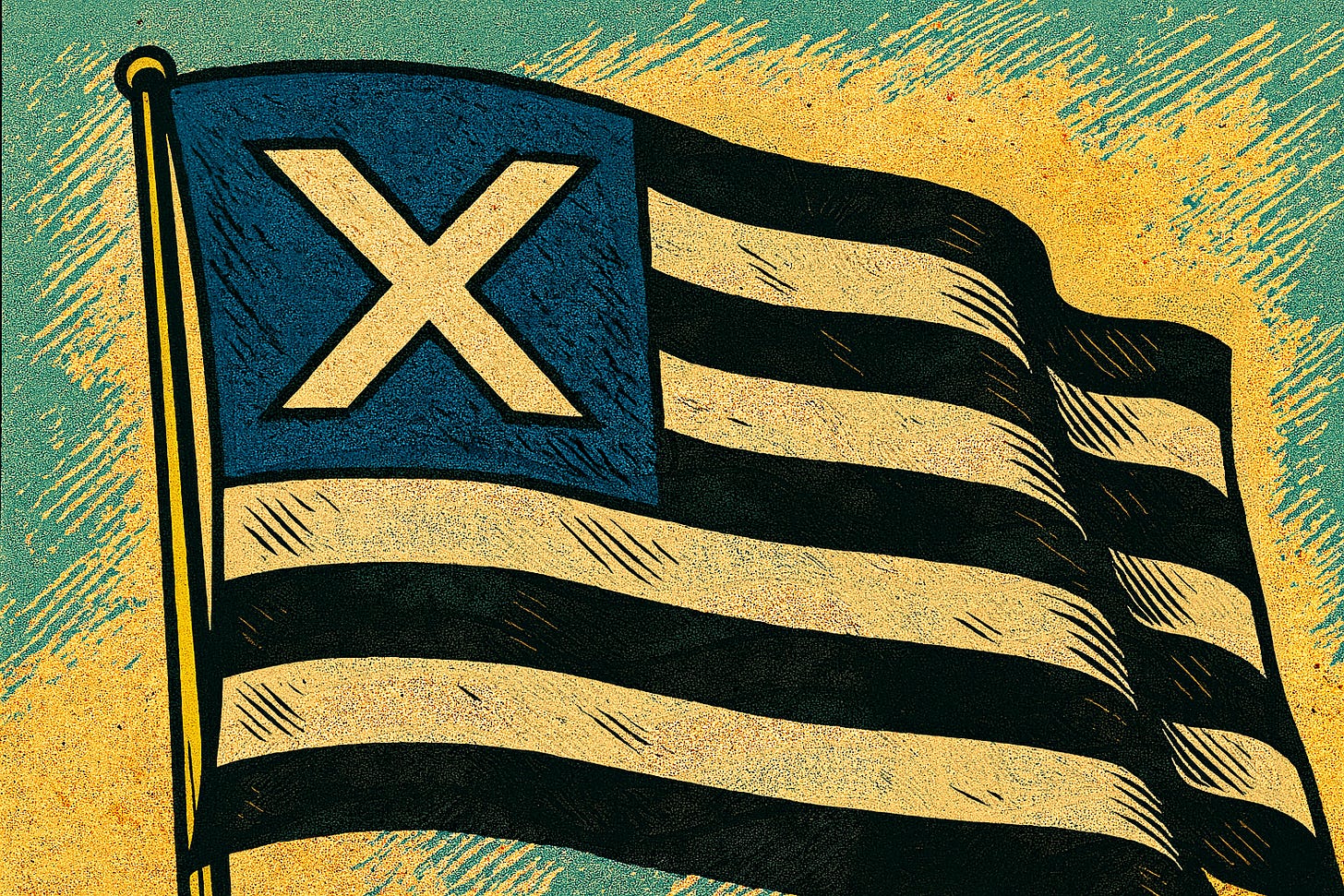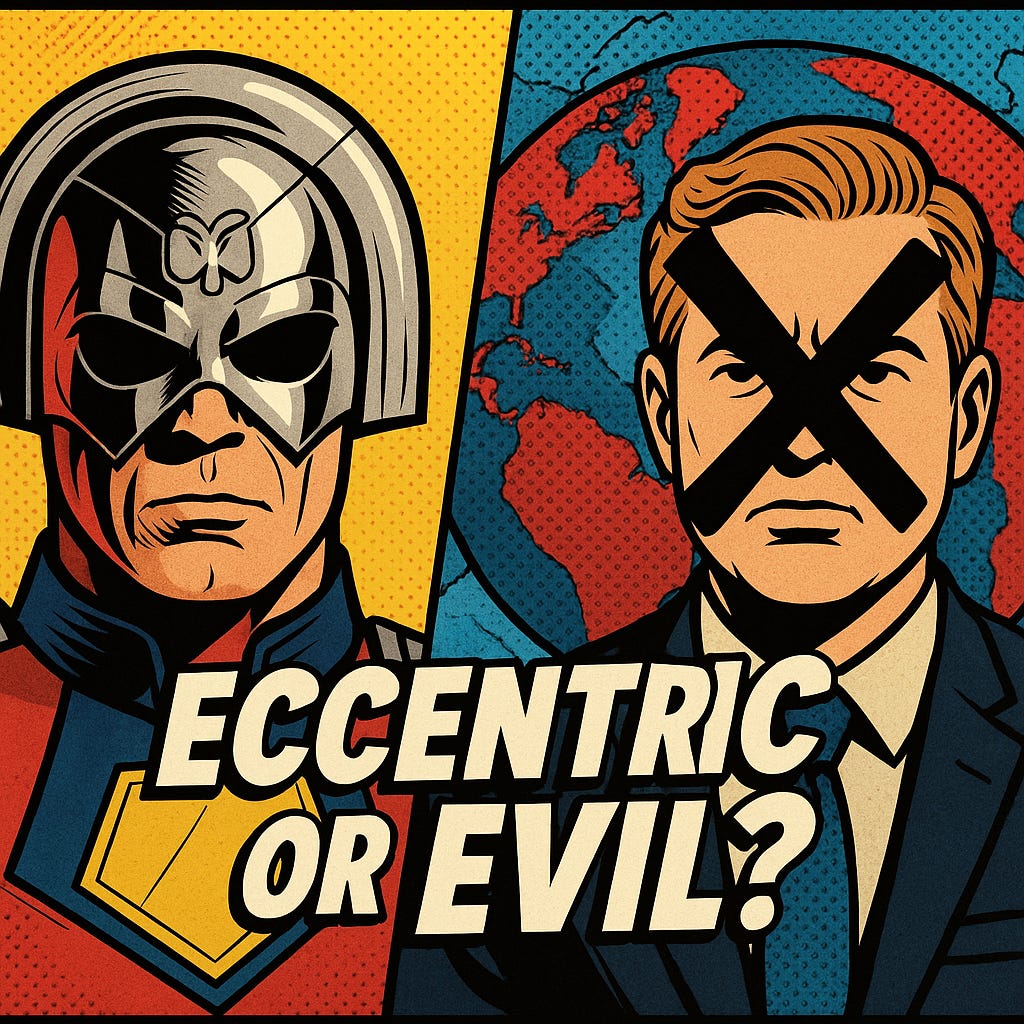Elon Musk and the Peacemaker Connection
Is X eccentric fun or a dogwhistle in plain sight?
If you’ve been watching Peacemaker Season 2, you may have caught a twist that feels oddly familiar. Spoiler alert: Peacemaker slips into an alternate universe known as Earth-X, a world introduced in the 1970s DC Comics where the Axis powers won World War II.
On the show, Earth-X is a dystopia where Black people are imprisoned, fascism runs rampant, and everything feels just a little too close to home.
Now, what does this fictional hellscape have to do with Elon Musk? A lot more than you might think.
The Letter X and Musk’s Obsession
Musk is obsessed with the letter X. Always has been.
His first big company? X.com (which later became PayPal).
His rockets? SpaceX.
His Twitter rebrand? You guessed it—X.
Even his child has a nickname: “Little X.”
On its own, this is just eccentric branding. But paired with the Earth-X connection? It starts to feel symbolic. Because with a tiny little tweak, an “X” can start looking a lot like a broken cross—one of those ugly symbols history keeps warning us about.
But why would I associate him with the racist alternate earth?
Musk’s Roots in Apartheid
Musk didn’t just stumble into wealth and power. He was born into it—in apartheid South Africa.
His grandfather, Joshua Haldeman, was a Canadian-born American who became wealthy and politically active in Canada’s Technocracy movement, a group advocating for engineers and machines to rule society in the name of “efficiency.” When that project lost steam, Haldeman moved his family to South Africa—just as apartheid was being codified into law in 1950.
He wasn’t some innocent bystander. By all accounts, he was instrumental in supporting apartheid’s implementation. That’s the soil Elon Musk was raised in.
By the late 1980s, Musk skipped out of South Africa—conveniently dodging mandatory military service just as apartheid was beginning to collapse under international pressure. He landed in Canada, where his wealth was intact, but his racial privilege was less… structurally guaranteed.
From Technocracy to Technocrats 2.0
What’s striking is how Musk’s worldview echoes his grandfather’s. The Technocracy Party wanted a world where engineers and machines ruled, where efficiency was measured in dollars, not human dignity.
Sound familiar? Musk’s Twitter/X experiments, his fixation on automation, his willingness to play with social order as though it were just another engineering puzzle—all of it traces back to those roots.
The apple doesn’t fall far from the technocratic tree.
The Comic Book Connection
Musk is a child of the same comic-book-saturated generation as the rest of us. He knows Earth-X. He knows what it symbolizes.
And yet, he’s chosen to brand himself around X—a symbol that can mean innovation, sure, but also secrecy, authoritarianism, even fascism.
So when Peacemaker drops us into Earth-X, and I see Musk’s dream world made reality the parallel is too on-the-nose to ignore.
Why It Matters
Elon Musk isn’t just a quirky billionaire with funny ideas. He’s the heir to a political lineage that helped enforce apartheid. He’s rebranding entire communication platforms under a symbol tied up in dystopia. And he’s doing it while the world shrugs, half-amused, half-terrified.
If Earth-X is a cautionary tale, Musk’s story is a reminder: authoritarianism doesn’t always arrive in jackboots. Sometimes it arrives in electric cars, satellites, and apps with sleek lowercase branding.
IBM made the systems used to track prisoners in concentration camps. Hugo Boss designed the uniforms. Let’s not get started on Volkswagen.
Corporate backing is a critical component of fascism. Technology makes it even more powerful.
Question for You
Do you think Musk’s obsession with “X” is just branding… or is there something darker at play?


